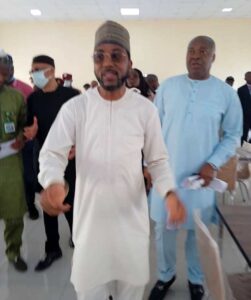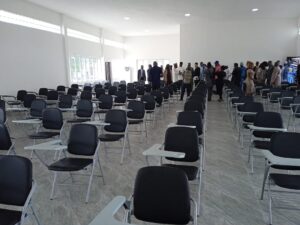Oluyinka Onigbinde
To commemorate his 100 days in office, the Managing Director of the Nigerian Port Authority (NPA), Mr Mohammed Bello Koko on Wednesday led stakeholders and dignitaries in the maritime industry to the commissioning of the agency’s dockyard training school in Apapa, Lagos following the renovation of the facility after years of being abandoned.

Speaking at the commissioning, the managing director of NPA, Mohammed Bello Koko stated that the commissioning of the training School is a testament of the agency’s resolve to institute continuous learning as a culture in the Nigerian Ports Authority.
He stated that a modern technical training facility, such as the one he commissioned is germane to the NPA, because of the opportunity to learn, unlearn and relearn which it offers, constitutes a critical success factor in actualizing the country strategic intent of becoming the maritime logistics hub for sustainable port services in Africa.
He explained that having in place a robust talent pool is a necessary precondition for operating efficiently in the fiercely competitive terrain that port business is.
Bello Koko further said consistently up skilling and reskilling NPA employees on whom it places a very high premium is the overriding objective as a management team, adding that the readiness to position them to be best in class is at the core of what the training school sets to achieve.
Giving a breakdown of the capacity of the training school, he said the complex has the capacity to training 380 persons per time as it consists of a lecture theatre with seating capacity 73, a large hall with seat capacity of 112, a mini hall with seat capacity of 50, another with 27 as well as six simulation class rooms that seats 16 persons each, a fully-automated library with seating capacity for 120 persons and a hostel with 30-bed capacity.

He said the decision to invest so much in the facility took cognizance of its former employees, some of whom he said although are retired but actually not tired and as such need to tap into their wealth of experience and institutional knowledge by inviting them as resource persons to train upcoming employees.
He noted that processes are also in the works to partner with the World Maritime University, the Nigerian Navy Hydrography Department. Nigerian Institute of Marine and Oceanography Research, the University of Lagos and other research and learning institutions in the area of curriculum development and capacity building.
He informed that work is at advanced stages to transform the NPA Riggers Workshop to a Marine and Seamanship Workshop to be deployed for training in the area of Seamanship Practical, Radio/Signal, Marine, Engine/Auxiliaries, Buoyage Practical, Mooring and other marine-related competencies which are increasingly in demand not just in-house, but indeed in the industry.
He also urged sister agencies in the maritime sector which are desirous of a best-in-class training platform for their employees to make use of the facility.
“Let me therefore seize this moment to recommend this facility for patronage by sister agencies in the maritime sector and other industry players who are desirous of a best-in-class training platform for their employees”, he said.
He told the stakeholders that: “Sustainably providing efficient port service in safe, secure, and customer environment requires that we ensure and assure our skill preparedness and put in place a robust talent succession planning procedure that places emphasis on best practice as a culture.
“Undoubtedly, a lot of hard work was put to make this project a reality, so I want to commend the Engineering Training, Facilities Management and all other departments who partnered with them to actualize this remarkable feat.
“The activation of this training facility is thus timely, as it is coming at a time when the series of efforts geared towards making our ports more competitive and thus attractive of greater vessel traffic are beginning to crystallize.
“This commissioning is also a reminder that our drive towards attaining the compliance status for Quality Management System (ISO 9001), Environment Management System (ISO 14001) as well as Occupational Health & Safety Management System (ISO 45001) is no fluke, and all hands must be on deck to make it a reality.
“Let me seize this opportunity to implore all users of this facility to make the best use of this facility. I expect that we begin to realize commensurate value for money spent.
“Let me add that there is a pressing need to deepen our maintenance culture, The sustainability of investments such as this rests heavily on how well we maintain them” he said.
Speaking also at the event, the Director General, Nigerian Maritime Administration and Safety Agency (NIMASA) Dr. Bashir Jamoh, stated that efficiency and effectiveness is a key factor for the maritime industry, and explained that no industry can achieve a significant growth without training of its staff.
“The objective of training not only in the maritime industry, cannot be overemphasized. There’s nothing you can do without training. We are experiencing new technology on a daily basis; we are experiencing new innovation at the international arena. Hence, we must match all those new development in the maritime sector with the international community, because shipping is international in nature.
Read Also: NIMASA To Entrench Home Grown Human Capacity Development – DG
“What is acceptable in the United Kingdom and Singapore, must be accepted in Nigeria. You dare not provide substandard workers. Our workers’ skills must be of standard of international community. In so doing, our younger generation would be able to have a place both locally and internationally.
“If we decide to produce substandard workers, at the end of the day, our certificate would be rejected and these young Nigerians would be rejected and we would continue to have only locally- trained manpower” he said.
Also speaking, an economist, Prof. Pat Utomi noted that unfortunately, Nigeria was not paying attention to the most important need of the country which was knowledge.
Utomi said that if the maritime industry which was a sector of Nigeria’s Blue Economy, could rise to its potential, it would help reduce unemployment in the country.
“But we cannot do that until people in the sector move ahead. And also key is how to get the most of the faculty.
“NPA needs to prove itself as the gateway of economy and in so doing move through that gate,” he said.
Some of the dignitaries that witnessed the unveiling of the facility were: Mrs Cecelia Gaya, Director General, Administrative Staff College of Nigeria (ASCON), Rear Admiral Yakubu Wambai, Flag Officer Command, Western Naval Command, Dr George Moghalu, Managing Director, National Inland Waterways Authority (NIWA), Mrs Vicky Hastruup, Chairman, Seaport Terminal Operators Association of Nigeria.
Kindly like us on Facebook















